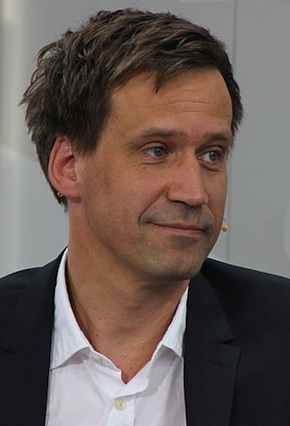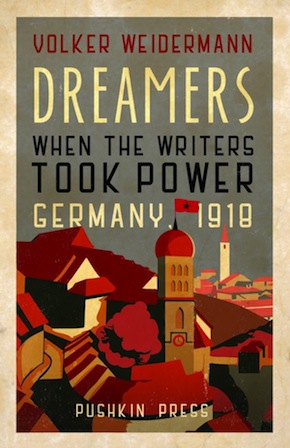The mountain king
by Mika Provata-CarloneIn the popular imagination, German history, culture and even reality closes down in 1918 with the end of WWI, the end of the German Empire and its Central European logic, the end of all order based on the authority of hereditary power, received structures, hierarchies, even typography. A strange, fantastical interlude begins, officially called the German Republic, unofficially still known as the German Reich, and derogatorily dismissed by Hitler in 1929 as the Republic of Weimar. It was a regressive-progressive, utopian yet pragmatic organism, countering fatality and defeat with phantasmagorical vision and inventiveness, daring enterprise and humility, and a Molotov cocktail of radical (and often confused) liberalism.
For the arts, literature, music, philosophy, architecture, life in society, the Weimar Republic’s middle period, comprising the years following the turmoil of the November Revolution, and ending brutally in 1929 with the economic crash, were almost inconceivably resplendent. Germany saw itself as setting the standards of new thought, new writing, new painting, new music, a new way of social and private existence, and it took those standards to the pinnacle and nadir of every extreme. Overshadowed by what followed, by the Valhalla years of Nazi rule, the intersession between WWI and WWII is for many an obscure blur, something that must have existed, even if we are not always quite sure how or in what shape, and which includes epiphanic moments such as the Neue Sachlichkeit, The Threepenny Opera, Metropolis and The Blue Angel, the novels of Thomas Mann, the philosophy of Heidegger, the poetry of Rilke.
When Germany emerged from its second total capitulation, that earlier part of the 20th century would come under almost frantic scrutiny: perhaps it contained the roots of all evil, the explanation for their society’s carcinogenic mutation into a monster, the answers to the questions of consciousness and conscience they did not dare (or perhaps wish) to ask. Margarethe von Trotta’s 1986 film Rosa Luxemburg, a seminal example of New German Cinema, is an example in point. The political, social, intellectual and cultural dynamics of the period, the vernacular agency of the people, the possibility of an alternative scenario, it was all too desperately vital to ignore. Whereas in 1919 the Nazis and the far right blamed the left for causing the WWI defeat, in post-WWII Germany, Rosa Luxemburg, the Spartacists, the resisting intellectuals of the interwar period would be hailed as the unsung heroes of an apocalyptic turning point that never took place.
He revisits, every time more critically, the 1919 polarity… to show how the extremes coalesced into the most catastrophic whole.”
Volker Weidermann is a German writer of an even newer generation that seeks to identify a similar foundation myth or story: why it all happened, or, more precisely, why something different was not allowed to change the course of a by now critically unwanted history. Weidermann has gone back, time and time again, to that particular moment in history, so rich in exegetical possibilities. He revisits, every time more critically, the 1919 polarity between black and white, populism and intellectualism, left and right, war and peace, hardcore practitioners of realpolitik and almost feral idealists, to show how the extremes coalesced into the most catastrophic whole. Was there a third way, that was never followed, is the recurring, unanswered question in all his writings.
He is an almost swooningly meticulous scholar of the period, with an intimate knowledge of details, dark or bright, of unsuspected anecdotal stories, of the faded scribblings in the margins of personal diaries and notebooks of those who saw, acted or kept still, whether out of cowardice or complicity. He also possesses a literary style that unsettlingly combines the ‘broken mains’ gushiness of the nouveau roman with a compulsive, obsessive persistence to pin down the reader. Thou shalt read to the end; thou shalt not escape the full impact of this flood of words, of scenes, of fragments of stories, of torn narratives and of dark subtexts, seems to be the basso continuo of his literary compositions.
Dreamers shows its cards openly from the very first: the title, English and German, is bursting with semiotic intentionality, with semantic codes and explicit contemporary references. Dreamers today are the people of Europe’s new lost generation, those who came into adulthood just as the world around them seemed to crumble and collapse from a new financial disaster, a new migration problem, a new unemployment crisis, new political darkness and erasure. The waves of non-European migrants are also dreamers, or rather nightmare-escapers. Cleverly, effectively, with masterful panache, Weidermann pulls together the strings of past and present into a tight knot. The dreamers of today should heed or take heart from the dreamers of yesterday.
Dreamers is an astonishing novel, or rather a historical reconstruction of a reality that really feels like the blackest fiction; a grand narrative that is both breathlessly dense and breathtaking. It somehow reads like an opium dream, the chronicle of an otherworldly experience, where familiar figures walk on and off the stage in highly disturbing guises. The focus is on the many phases of utopia, revolution and dissolution that took place in Munich in just a few terrific and terrifying months after Germany’s WWI defeat. For Weidermann, this is the scene of the crime, and he gives us the police report of a re-enactment at the scene where it was perpetrated, and before what feels like a theatre audience. He is not hasty to give away the exact nature of the crime (it is not simply the assassination of Kurt Eisner). He builds up our anticipation carefully, almost relentlessly, holding up before our eyes every relevant or misleading piece of evidence.
It is a thrillingly thorough, almost minute-by-minute account of all that happened, with the wisdom or the cynical certainty of hindsight, and a magician’s flair for pulling blindingly white rabbits out of hats one did not even suspect were there. Read Dreamers closely and you will get a sense of vertigo as well as of sheer incredulity. Did all this really happen? Weidermann assures us that it did, embedding shred after shred of proof. Eisner, Ernst Toller, Rainer Maria Rilke, Thomas Mann, Nietzsche, Beethoven, Wagner, they were all there, they were all implicated, and in ways that might make you reel. Hitler is also there, as is Oswald Spengler, the von Stauffenberg twins and even Walt Whitman.
Weidermann is dazzlingly irreverent, racy, shrewdly knowledgeable, a demythologiser with a very precise agenda: the clinical diagnosis of Germany’s sickness that led to Nazism and WWII.”
There is a perceptibly cruel irony in Weidermann’s title, since the writers’ takeover of power is a dark madness, the writers themselves puppets of their own fictional puppeteers in a surreal game of make-believe or very real horror and horrible consequences. Dreamers becomes an ominously charged signifier in this context. In a way, Dreamers is about rhetoric as power, rather than the power of rhetoric, and Weidermann stigmatises the sophistry behind much of what was said and happened, as well as proving that he is dazzlingly irreverent, racy, shrewdly knowledgeable, a demythologiser with a very precise agenda: the clinical diagnosis of Germany’s sickness that led to Nazism and WWII. The result is a feverish narrative, driven by the need to fit in what seems to amount to no less than a revelation – of both heaven and hell.
This sometimes gives Dreamers a rather Spenglerian feeling, a monumental quality of being the testimony for a Courtroom of History, where no one is to be given any slack. Especially not those who dreamt of Magic Mountains and fought in near-madness to be Mountain Kings. Weidermann can be full of Wagnerian high notes, baritone gravitas and a hefty dose of ambiguity as he conjures up this virtual twilight of the gods, literally the death of Western civilisation due to the empty idealism or fanatical intellectualism that he is determined to expose. He is nonetheless, and without exception, a highly beguiling and convincing storyteller who will shock you, amaze you, stun you into both action and reaction. You will want to argue with him about both right and wrong, about true and false perspective, about who his heroes, anti-heroes and outright villains really were. Such is its power to stir you and awaken you. The perfect read for the end of 2018, to mark the centenary of the end of WWI in a very different, perhaps even more harrowing way.
 Volker Weidermann is an award-winning writer and literary critic, and the cultural editor of Der Spiegel. He was born in 1969, and studied Political Science and German Language and Literature in Heidelberg and Berlin. His previous book Summer Before the Dark (Pushkin Press, 2016) was a BBC Radio 4 Book of the Week. Dreamers: When the Writers Took Power, Germany, 1918, is published in hardback and eBook by Pushkin Press, translated by Ruth Martin.
Volker Weidermann is an award-winning writer and literary critic, and the cultural editor of Der Spiegel. He was born in 1969, and studied Political Science and German Language and Literature in Heidelberg and Berlin. His previous book Summer Before the Dark (Pushkin Press, 2016) was a BBC Radio 4 Book of the Week. Dreamers: When the Writers Took Power, Germany, 1918, is published in hardback and eBook by Pushkin Press, translated by Ruth Martin.
Read more
@PushkinPress
Author portrait Heike Huslage-Koch/Wikimedia Commons
Ruth Martin is a freelance literary and academic translator, with a particular interest in history, philosophy and psychology. She teaches translation at the University of Kent, and is a co-chair of the Translators’ Association committee.
german-to-english-translation.org
@the_germanist
Mika Provata-Carlone is an independent scholar, translator, editor and illustrator, and a contributing editor to Bookanista. She has a doctorate from Princeton University and lives and works in London.


